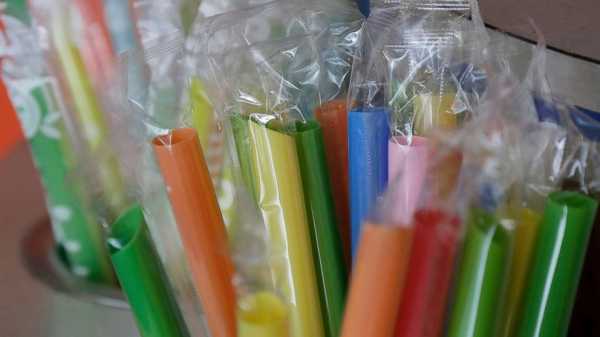
Plastic is versatile, lightweight, cheap — and seemingly everywhere. It’s also a scourge on the environment.
While plastics have important uses, the bulk of plastic waste — much of which ends up clogging landfills and polluting oceans — comes as things designed to be used exactly once, and often for only a few minutes.
“We produce around 407 million tons of plastics a year globally,” says Kera Abraham Panni, conservation and science outreach manager at the Monterey Bay Aquarium, which is trying to spread the word about plastics that pollute oceans. “Of that, only 9 percent is recycled.”
And sanitation experts say “downcycling” may be a more accurate term than “recycling” where plastics are concerned. While glass and metal can be recycled and made into something of the same quality, plastics degrade as they go along.
“With plastics, you’re just delaying their eventual journey to the landfill,” says Amy Korst, author of “The Zero-Waste Lifestyle: Live Well by Throwing Away Less” (Ten Speed Press).
Twenty-two aquariums across the country have launched a coordinated campaign to reduce sources of plastic pollution, starting with straws.
“Cutting back on plastic straws doesn’t solve the problem, but it’s an important first step,” says Monterey Bay Aquarium Executive Director Julie Packard, in California. “It gets people thinking and talking about ways they can reduce their reliance on single-use plastic items, and encourages the innovation of ocean-friendly alternatives.”
The campaign kicked off during #NoStrawNovember, a nationwide movement asking people who don’t need them to refuse plastic straws for 30 days.
“We simply can’t recycle our way out of this problem, and single-use plastics are an easy place to start changing things,” Panni says. “They’re used so fleetingly, and then spend hundreds of years in the environment. And they’re really not necessary.”
Others are finding ways to cut down on plastic bags, bottles and containers.
“It can seem intimidating, but more and more people are showing that it can be done. You see it everywhere now. Kids bringing metal lunch containers to school, people and businesses saying no to plastic straws and shopping bags,” says Elizabeth Graves, editor in chief of Martha Stewart Living magazine.
Says Panni: “We encourage people to approach this by saying: Refuse, rethink and reuse. Recycle is a last resort, and when you do buy plastic products, try to make sure they’re recycled plastics.”
She recommends that customers in stores and restaurants refuse single-use plastics like cups, straws, utensils and bags, and explain why to the managers.
On a household level, plan ahead so that you bring from home any items you might need later in the day, like a shopping bag or utensils — just as you’d grab an umbrella before heading out on a rainy day, Panni says.
Switching to reusable glass or metal containers, metal utensils, compostable produce bags, and compostable or washable straws are all relatively easy ways to opt out of single-use plastics.
On the community level, environmentalists recommend reaching out to local leaders, restaurants and businesses.
“You can use your power as a consumer to thank businesses that you see doing the right thing,” Panni says. “Restaurant and store managers don’t often hear people say ‘thank you,’ and your words and actions can make a difference.”
Korst suggests keeping a stash of reusable containers in your car. She says there’s an art to approaching store managers to request an alternative to single-use plastic containers.
“Use a friendly approach when you ask a cashier . to accommodate your request. Measuring the tare weight of a container does take a little time, so be sure to explain why you’re bringing your containers to the store, and say thank you to a helpful cashier,” she writes in her book.
“A little thinking ahead can make a really big difference,” Panni says. “Are a few minutes of convenience really worth causing plastics to spend all those years in landfills or oceans?”
Sourse: abcnews.go.com
0.00 (0%) 0 votes


































